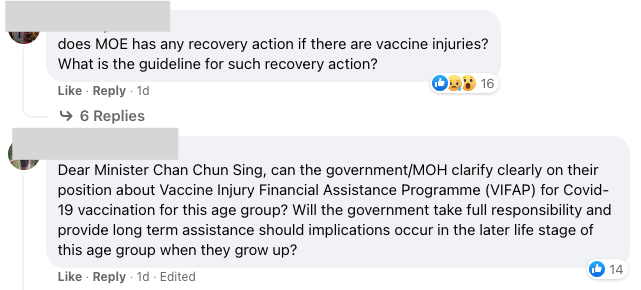Singapore — Parents can soon book the Covid-19 vaccination for their children in the 5-11 age group from next week if supplies “arrive on schedule”, says Education Minister Chan Chun Sing.
“As parents, we all want our children to be healthy and safe. Vaccination against Covid-19 will help minimise the chances of our children getting seriously ill if they do get infected, especially with the latest Omicron variant of concern,” Mr Chan said on Tuesday in a Facebook post.
As more kids get vaccinated, more learning activities such as sports and games, critical to children’s physical, cognitive and socio-emotional well-being and development, can resume.
Things have moved quickly. It was only last Friday that the Health Ministry (MOH) announced that the Health Sciences Authority had approved the Pfizer BioNTech vaccine for children in the 5 to 11 age group.
It will be offered to more than 300,000 children in this age group, including long-term pass holders in Singapore.
With the benefits far outweighing the risks, he said, his ministry is working closely with MOH and the Early Childhood Development Agency to prepare for the vaccination exercise.
The authorities are awaiting confirmation of the arrival date of the BioNTech vaccine for young children, which is one-third of the adult dosage.
“If delivery arrives as scheduled, we will progressively open up the booking of vaccination appointments next week, and the vaccination exercise will start from end-December 2021 for the older children in Primary 3-5” and early 2022 for the younger group, said Mr Chan, noting more details will be provided once the delivery schedule is confirmed.
“Vaccination, together with safe management measures and good personal hygiene, will strengthen our suite of measures to protect our children,” he added.
Meanwhile, several parents who commented on his post, seem concerned about how the vaccine would affect the children.



They also requested more information in general, as well as what would happen should parents withhold consent for their children to be vaccinated.



Some also asked if injuries or severe adverse effects resulting from the vaccination would also be covered by the Vaccine Injury Financial Assistance Programme, which is extended to those who suffer adverse side effects after getting vaccinated.


The programme provides for those who experience serious side effects resulting in death or permanent severe disability to receive S$225,000. Those who have to be admitted to high-dependency or intensive care with subsequent recovery will receive S$10,000.
Those whose side effects require hospitalisation and medical intervention, with subsequent recovery (excluding observation at the Accident & Emergency without subsequent inpatient admission or medical intervention), will receive S$2,000.
MOH, said the programme is a goodwill financial assistance scheme independent of existing healthcare financing and insurance schemes. It provides an additional layer of financial support for patients who have suffered from serious side effects caused by the vaccine.
In phase 3 clinical trial, results of the BioNTech paediatric vaccine in children aged 5-11 years have shown around a 90-per-cent reduction in the risk of symptomatic infection. /TISG

